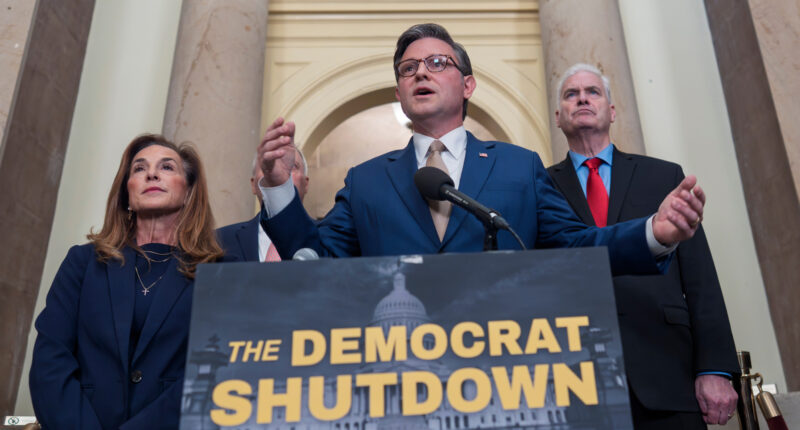Share this @internewscast.com
The possibility of quickly ending the government shutdown seemed to be dwindling on Friday as both Republicans and Democrats prepared for an extended clash, and President Donald Trump made plans for possible federal job cuts and spending reductions.
Senators were returning to the Capitol for another vote on funding the government as the shutdown entered its third day. However, there were no clear signs of progress in resolving the deadlock. Democrats insisted on the extension of health care benefits, while Republicans were attempting to pressure them by consistent voting on a House-approved bill to temporarily reopen the government, mostly keeping spending at current levels.
“I’m not sure how many times you’ll give them the chance to vote no,” stated Senate Majority Leader John Thune at a Friday press briefing. He mentioned allowing the weekend for Democratic senators to reconsider their positions.
Although Republicans control the White House and both legislative chambers, the Senate’s filibuster rules require 60 out of 100 senators to support government funding legislation. This situation allowed Democrats the opportunity to utilize their 47 Senate seats as leverage for policy negotiations. The party chose to focus on health care, viewing it as a crucial issue for regaining influence in Washington.
Democrats’ main request was for Congress to extend the tax credits, which were heightened during the COVID-19 pandemic, for health care plans available through the Affordable Care Act marketplace.
On the steps of the U.S. Capitol on Thursday, House Democratic leader Hakeem Jeffries stated, “Understand this, over the past few days and the days to follow, over 20 million Americans will face drastically increased health care premiums, co-pays, and deductibles due to the Republicans’ refusal to extend the Affordable Care Act tax credits.”
The shutdown gamble
Democrats are running the high-risk strategy of effectively voting for a government shutdown to make their stand. Trump has vowed to make it as painful as possible for them.
The Republican president has called the government funding lapse an “unprecedented opportunity” to make vast cuts to federal agencies and potentially lay off federal workers, rather than the typical practice of furloughing them. White House budget director Russ Vought has already announced that he is withholding billions of dollars for infrastructure projects in states with Democratic senators.
On Friday morning, Vought said he would withhold another $2.1 billion for Chicago infrastructure projects to extend its train system to the city’s South Side.
Jeffries has displayed no signs of budging under those threats.
“The cruelty that they might unleash on everyday Americans using the pretense of a shutdown is only going to backfire against them,” he said during an interview with The Associated Press and other outlets at the Capitol.
Still, the shutdown, no matter how long it lasts, could have far-reaching effects on the economy. Roughly 750,000 federal employees could be furloughed, according to the nonpartisan Congressional Budget Office, and they could lose out on $400 million in daily wages. That loss in wages until after the government reopens could drive down wider demand for goods and services.
“All around the country right now, real pain is being endured by real people because the Democrats have decided to play politics,” said House Speaker Mike Johnson on Friday.
Who will take the blame?
The American public usually spreads the blame around to both major political parties when it comes to a government shutdown. While Trump took a significant portion of the blame during the last partial government shutdown in 2018 as he demanded funding for a U.S.-Mexico border wall, this standoff could end differently because now it is Democrats making the policy demands.
Still, lawmakers were relentlessly trying to make their case to the American public with a constant beat of news conferences, social media videos and livestreams. Congressional leaders have been especially active.
Both sides expressed confidence that the other would ultimately be found at fault. And in the House, party leaders seemed to be moving farther apart rather than closer to making a deal to end the shutdown.
Jeffries on Thursday called for a permanent extension to the ACA tax credits. Meanwhile, Johnson and Thune told reporters that they would not negotiate on the tax credits until the government is reopened.
Talks in the Senate
A few senators have engaged in bipartisan talks about launching negotiations on extending the ACA tax credits for one year while the Senate votes to reopen the government for several weeks. But those discussions are in their early stages and appear to have little involvement from leadership.
As senators prepared for their last scheduled vote for the week on Friday, they appeared resigned to allow the shutdown to continue at least into next week. Thune said that if the vote failed, he would “give them the weekend to think about it” before holding more votes.
Sen. Amy Klobuchar, in a floor speech, called for Republicans to work with her and fellow Democrats to find “common ground” on the ACA subsidies, saying their expiration would impact plenty of people in states with GOP senators – especially in rural areas where farmers, ranchers and small business owners purchase their own health insurance.
“Unfortunately, right now our Republican colleagues are not working with us to find a bipartisan agreement to prevent the government shutdown and address the health care crisis,” she said. “We know that even when they float ideas – which we surely do appreciate – in the end the president appears to make the call.”
Copyright © 2025 by The Associated Press. All Rights Reserved.

















